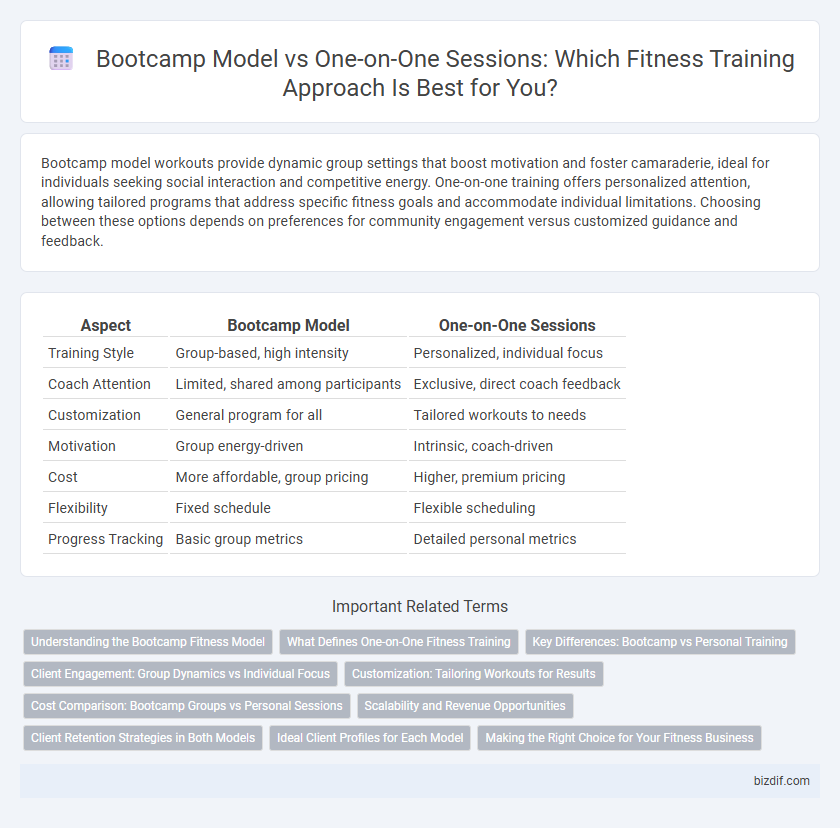Bootcamp model workouts provide dynamic group settings that boost motivation and foster camaraderie, ideal for individuals seeking social interaction and competitive energy. One-on-one training offers personalized attention, allowing tailored programs that address specific fitness goals and accommodate individual limitations. Choosing between these options depends on preferences for community engagement versus customized guidance and feedback.
Table of Comparison
| Aspect | Bootcamp Model | One-on-One Sessions |
|---|---|---|
| Training Style | Group-based, high intensity | Personalized, individual focus |
| Coach Attention | Limited, shared among participants | Exclusive, direct coach feedback |
| Customization | General program for all | Tailored workouts to needs |
| Motivation | Group energy-driven | Intrinsic, coach-driven |
| Cost | More affordable, group pricing | Higher, premium pricing |
| Flexibility | Fixed schedule | Flexible scheduling |
| Progress Tracking | Basic group metrics | Detailed personal metrics |
Understanding the Bootcamp Fitness Model
The Bootcamp fitness model emphasizes group-based high-intensity interval training (HIIT) designed to improve cardiovascular endurance, strength, and agility through diverse, functional exercises. This approach leverages peer motivation and structured workout circuits that target multiple muscle groups, maximizing calorie burn and overall fitness in a time-efficient manner. Unlike one-on-one sessions, bootcamp programs offer a dynamic, community-focused environment that enhances accountability and sustained commitment to fitness goals.
What Defines One-on-One Fitness Training
One-on-one fitness training is defined by personalized workout plans tailored to an individual's goals, fitness level, and physical limitations, ensuring maximal effectiveness and safety. This model offers direct, continual feedback and motivation from a certified personal trainer, enabling precise technique correction and fast progress. Emphasizing personalized attention, one-on-one sessions foster accountability and consistent performance improvements unmatched by group-based bootcamp models.
Key Differences: Bootcamp vs Personal Training
Bootcamp fitness training involves group sessions that emphasize high-intensity, circuit-style workouts designed to build endurance, strength, and teamwork, while one-on-one personal training offers customized exercise plans tailored to individual goals, fitness levels, and personal needs. Bootcamp provides a motivating social environment and typically follows a fixed schedule, whereas personal training delivers focused attention, real-time feedback, and adaptation based on progress and injury history. The choice between bootcamp and personal training depends on preference for group dynamics versus personalized guidance and the specific fitness objectives sought.
Client Engagement: Group Dynamics vs Individual Focus
Bootcamp model leverages group dynamics to boost client engagement through shared motivation and social accountability, enhancing overall workout intensity and consistency. One-on-one sessions provide personalized attention, enabling trainers to tailor exercises and feedback according to individual client needs and goals. While bootcamps foster community support, one-on-one training excels in addressing specific fitness challenges and progress tracking.
Customization: Tailoring Workouts for Results
Bootcamp training offers a dynamic group environment that drives motivation but follows a standardized workout plan, limiting individual customization. One-on-one sessions provide personalized fitness programs tailored to specific goals, fitness levels, and injury considerations, optimizing performance and results. Customization in personal training ensures targeted progress through precise adjustments in intensity, exercises, and recovery strategies aligned with individual needs.
Cost Comparison: Bootcamp Groups vs Personal Sessions
Bootcamp training typically offers a lower cost per session due to the group format, making it an affordable option for those seeking structured fitness guidance. One-on-one sessions demand a higher investment since they provide personalized attention and customized programming tailored to individual goals. Choosing between bootcamp groups and personal sessions depends on budget constraints and the desired level of individualized coaching.
Scalability and Revenue Opportunities
The Bootcamp model offers high scalability by accommodating multiple clients simultaneously, maximizing revenue per session while reducing the cost of trainer time. One-on-One sessions provide personalized training, enabling premium pricing but limiting client volume and overall revenue potential. Businesses seeking rapid growth often favor Bootcamp models for efficient scaling and consistent income streams.
Client Retention Strategies in Both Models
Bootcamp training leverages group dynamics to enhance client motivation and foster a sense of community, which significantly boosts client retention through social accountability. One-on-One sessions provide personalized attention and customized workout plans that address individual goals and limitations, leading to higher satisfaction and long-term client commitment. Integrating progress tracking and regular feedback in both models ensures continuous client engagement and reinforces retention strategies effectively.
Ideal Client Profiles for Each Model
Bootcamp training suits clients seeking community motivation, structured group workouts, and cost-effective solutions, often appealing to beginners or those looking to improve general fitness in a social environment. One-on-one sessions target individuals requiring personalized attention, tailored programming, and specific goal achievement, ideal for advanced athletes, rehab patients, or clients with unique fitness needs. Understanding these ideal client profiles helps fitness professionals optimize service offerings and enhance client satisfaction.
Making the Right Choice for Your Fitness Business
Bootcamp training offers high-energy group workouts that maximize client engagement and increase revenue through volume, ideal for businesses targeting community-driven fitness experiences and efficient use of space. One-on-one sessions provide personalized coaching tailored to individual goals, enhancing client retention and enabling premium pricing due to customized attention and progress tracking. Choosing between the Bootcamp model and One-on-One sessions depends on your business's capacity, target audience preferences, and the value proposition you want to emphasize for sustainable growth.
Bootcamp Model vs One-on-One Sessions Infographic

 bizdif.com
bizdif.com